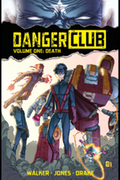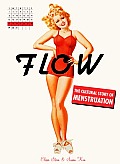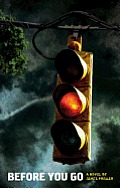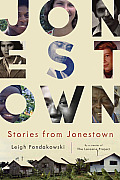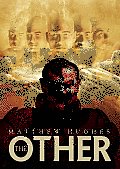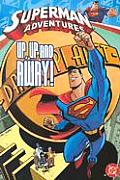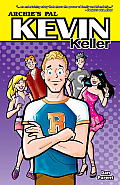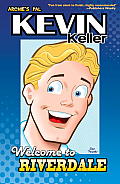Link to this review in the form of a comic strip by geneambaum tagged superhero • graphic novel
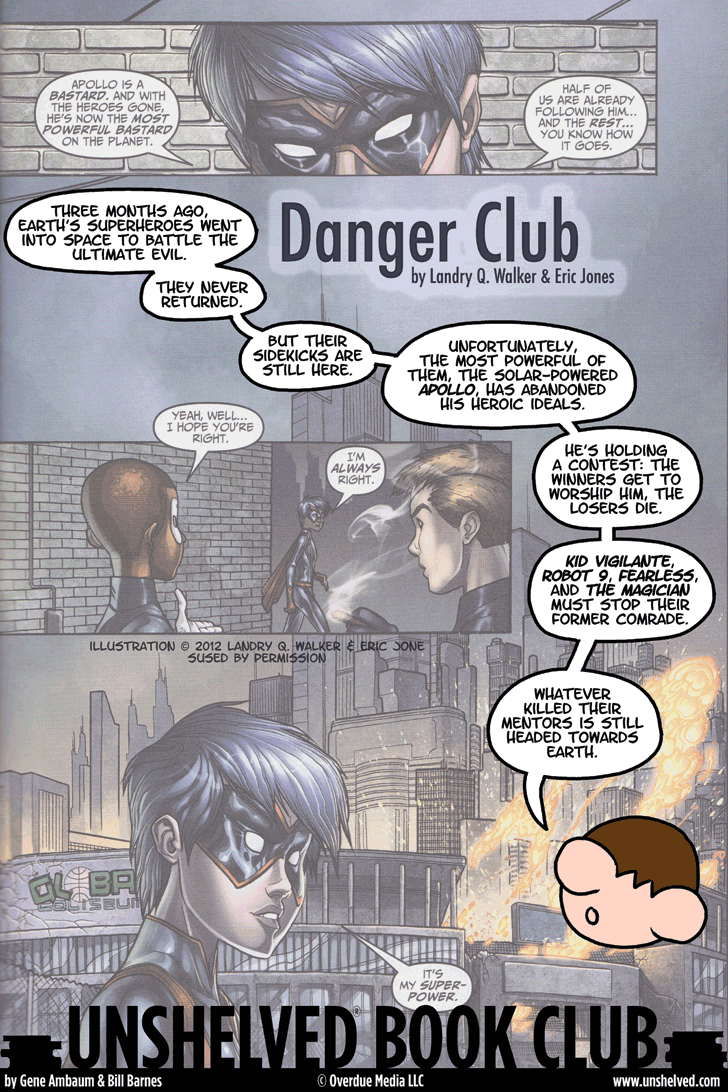
Click for the full-sized comic
@bookblurb Earth’s superheroes went into space and never came back. Their sidekicks must stop whatever took them out.
Link to this review by flemtastic tagged biography • nonfiction
Joy Division’s lead singer, Ian Curtis, committed suicide the day before the band was supposed to leave for its first American tour. Despite their short run as a band, they managed to have a huge influence on music. Surviving members enjoyed success as New Order, and Joy Division is cited as a strong influence by U2, Radiohead, the Red Hot Chili Peppers, and others.
Founding member Peter Hook recounts the early days of the band before the mercurial Curtis came on board, and before the taciturn Steve Morris filled their need for a powerful drummer. Things were rough without money for decent equipment or practice space, and with a very competitive local live music scene. However, punk’s DIY ethic served them well, and they played gigs everywhere they could, carrying their own instruments and transporting their gear in a beat-up van. There were small instances of fighting among the band members, and an example of worrisome behavior when Ian freaked out during a show, cut himself with glass and scared fans. Ian’s epilepsy was a cause for real concern, but unfortunately it did not result in any rest and recuperation when the band hit their stride touring. In retrospect, Hook wishes they had pushed Ian to stop for a while, but Ian always insisted on continuing. (The band had always said that if any of the four members quit, Joy Division would cease to exist. It did on the 18th of May, 1980, with Curtis’ suicide.)
Hook includes set lists and important performance dates, along with recollections about the recordings of both Joy Division albums and song-by-song descriptions of what fans should listen for.
Why I picked it up: I loved New Order back in the 1980’s and knew that New Order came out of the suicide of its lead singer, but beyond that, nothing. So, when I saw this book by a surviving member of the band, I jumped on it.
Why I finished it: The anecdotes. In their practice space in an unheated, abandoned warehouse, Hook says the band would pee into glass bottles and then stack them on the shelves. Occasionally someone would get a golden shower when trying to add another bottle. Later, when the band was really coming together and playing a lot of gigs, Ian’s epilepsy issues became serious and were often exacerbated by the strobe lights at shows. Hook once found Curtis in the bathroom, passed out after a fit, with a gash in his forehead from hitting the toilet when he fell. Another time, when the band was refused payment after a rough set where tripped fuses took out their amps repeatedly, the band grabbed thirty frozen chickens from a freezer as their fee for the show.
I’d give it to: My friend Jayson, who picked up the guitar at the same time I did (in college), but who continues to play and practice. He would enjoy Hook’s detailed descriptions of how Joy Division achieved their spare, moody sound with pedal effects and studio techniques.
@bookblurb The story of the influential band Joy Division, from its early days to lead singer Ian Curtis’s suicide.
Link to this review by darcy tagged history
A cultural history of menstruation.
Why I picked it up: I’ve always wanted to know how women in different historical periods dealt with menstruation, specifically what products they used. (This was never covered in school or in any of the historical novels I read.)
Why I finished it: Photo after photo of strange feminine hygiene products made me cringe and giggle. There were outlandish inventions from electric shock corsets to cure female hysteria to belted maxi pad holders (a close relative of the jock strap), from the all-in-one “sanitary bloomers” to the many creams, sprays and tonics used to deal with things down there. Throughout the pages are cultural tidbits, like how women in the ancient world dealt with that time of the month (papyrus in Egypt, wool in Rome), and old magazine ads peddling products via glamorous or nervous looking housewives. The book includes a timeline of important historical and cultural events that includes the invention of tampons and pads, as well as books like Are You There God? It’s Me, Margaret and Carrie that brought first period scenes to young readers and into pop culture.
I’d give it to: My great-grandmother, Wanda. As the family lore goes, she once had the thankless job of washing “towels” for rich ladies visiting a dude ranch. She claims the laundry water helped her grow the most beautiful roses on the ranch.
@bookblurb A cultural history of menstruation including photos of odd and historical feminine hygiene products.
Link to this review by danritchie tagged coming of age
It is the beginning of the summer before his senior year, and Jude is starting his first job at Jones Beach on Long Island. Seven years ago while he was watching his younger sister, she drowned in the family pool when he was distracted by a video game, and now he is just beginning to believe in himself again. He hangs out with his friends, especially Corey who understands the burden Jude carries. After he meets Becka, a cashier at the park where he works, they grow close, and Jude feels like his life is back on track.
Then there is a deadly car accident, and Jude finds himself once again trying to understand death and struggling to piece his life back together.
Why I picked it up: While browsing, I noticed the first chapter of the book was white text on black page. So I opened it and read the riveting first chapter, a description of a car accident involving four teens. I was hooked.
Why I finished it: The book opened with the car crash. I knew someone had died but not who. As the story progressed so does the tension — as I became more and more familiar with the characters, the looming tragedy became oppressive and compelling.
I’d give it to: My friend Carol, who counsels grieving kids, will enjoy watching Jude’s bitterness and despair give way to hope as he slowly begins to realize he still has friends and family who care for him, and that his sister and his dead friend would both have wanted him to move on.
@bookblurb After a deadly car accident, Jude grapples with death and struggles to put his life back together again.
Link to this review by flemtastic tagged history
Everyone knows what happened in the jungle of Guyana on Nov. 18th, 1978: 918 Peoples Temple parishioners died in a mass suicide/murder as directed by their leader, Jim Jones. What people do not know is how difficult it has been for survivors to deal with the guilt of living through that event and to reconcile their positive memories of the church with what Jones did.
Fondakowski spent several years gathering interviews and researching to create a play about Jonestown (The People’s Temple, premiered in 2005). This book contains the overwhelming amount of material that she gathered but that she could not shoehorn into the play. With extensive participation by one of Jim Jones’ surviving sons as well as other survivors, Fondakowski lays a solid foundation about why believers were attracted to the Peoples Temple and why they stayed. Jones’ magnetic personality was certainly part of it, but the author argues that many came because of the social and political stances of the church as well as the rich social life. Many in the church were fleeing racial unrest and discrimination in the United States, and completely bought Jones’ vision of a utopia in the Guyanan jungle. Jonestown was fairly impressive, both in terms of its size and also its quick construction. Fondakowski is sympathetic to the parishioners of Peoples Temple and clearly expresses her desire to show them as real people and not as the brainwashed suicides as they have been portrayed for decades. She is, however, not sympathetic to Jones at all, and tells in detail of his drug use, sexual practices, and how he elevated himself to God-status.
Why I picked it up: I read a book in the 1980s about Jim Jones and the Peoples Temple. (I was eight years old when the suicide/massacre took place.) Ever since then, I read any anything I can find about the church.
Why I finished it: I learned a lot of new details from this book. Some of them were macabre, like the fact that cyanide smells like almonds. A California historical society has an envelope of buttons that were collected in Jonestown — they burst off the clothes of the dead who were bloating in the sun. Jones had made church members practice mass suicide, which he called White Nights, in case the CIA or the Guyanan military came after them. Jones even arranged a fake assassination attempt on his own life so that his followers would buy into his paranoia. And I found out the distasteful phrase “Drink the Kool-Aid” is actually a misnomer; it was not Kool-Aid that ameliorated the bitter taste of the cyanide, it was a powder called Flavor-Aid. Jones’ fake assassination was only the last in a long line of fake events. He also rigged ox-blood through lines taped down his arms to be able to spurt blood from his palms on demand as a mark of stigmata. His practice of pretending to heal cancer on stage was nothing but illusion.
I’d give it to: Stu, who would be shocked that there are still people who defend the Temple.
@bookblurb Survivors of Jonestown share stories of the People’s temple, Jim Jones, and their guilt.
Link to this review by geneambaum tagged science fiction
Luff Imbry, an obese thief, forger, and epicure, is betrayed by his contact and kidnapped in the middle of an illegal deal on Old Earth. The ship he finds himself aboard deposits him on Fulda, a flat, featureless, backward world he’s never heard of. The list of those who might have grievances against him is long. Luff needs to find a way off Fulda, and then exact revenge. He joins a group of odd-looking entertainers. But as he begins to puzzle out the nature of Fuldan society and his low place in it, he’s framed for murder. Making matters worse, a local law enforcement officer seems to have it in for Luff, who is puzzled by the nature of the man’s obsession with him.
Why I picked it up: At Seattle’s University Bookstore it was part of a display of books nominated for the Philip K. Dick Award.
Why I finished it: There’s a great Star Trek quality to the way Luff had to figure out the way things worked on Fulda because his fellow freaks couldn’t or wouldn’t explain things to him. (I found myself thinking about away missions where the Enterprise crew landed on a planet and tried to figure out why everyone was so happy or why they all dressed like Romans, but no one seemed to understand their questions.)
And Luff isn’t an idiot. He pays attention and he’s smart. He didn’t misread any obvious clues to help advance the plot. He simply kept trying to figure out how to survive and get off the planet.
I’d give it to: Dee. As the years have passed, she’s learned to do the little things to make her days (and her vacations) just a little better. She’d appreciate Luff’s annoyance at having to do without the comforts modern technology would provide him on any civilized planet. (Fulda doesn’t even have a spaceport.)
@bookblurb An obese con man uses his wits to deal with the law and escape the strange, backward planet he is marooned on.
Link to this review by billba tagged graphic novel • superhero
Stories of Superman in the style (and continuity) of Superman: The Animated Series.
Why I picked it up: When these first came out I snatched them up to read to my then-toddler son, Theo. I figured they’d be simpler to understand than those set in DC’s ever-changing (and, in my opinion, ever-worsening) mainstream universe.
Why I finished it: I enjoyed them more than he did. Mark Millar went on to write such edgy titles as Wanted and Kick-Ass, but here he lovingly pays homage to the Superman of the 60s and 70s I grew up with. The stories aren’t complicated; they’re just good fun with familiar characters. Bonus points for managing to get Terry Austin, world’s best inker, on the art team.
I’d give it to: Zack Snyder, director of the upcoming Man of Steel. I know once he reads this he’ll abandon his angst-ridden origin story and give us pranks by the hilarious Mr. Mxyzptlk and power-stealing by the purple Parasite.
@bookblurb The Man of Steel battles Mr. Mxyzptlk, the Parasite, and others, in modern adventures with a classic feel.
Link to this review by snow tagged graphic novel • coming of age
There’s a new kid in town! Kevin Keller and his family have just moved to Riverdale and already he’s caused quite a splash by tying Jughead in a hamburger eating contest. Veronica thinks she’s found the perfect guy for her until she finds out Kevin is gay. But it turns out he’s the perfect friend, and the two are quickly running up big phone bills talking for hours.
After Kevin and his family settle in, he’s soon a big part of Riverdale life — running for class president, going on his first date, planning the prom, and trying to reign in Veronica when she goes overboard!
Why I picked it up: I wanted to support Archie Comics in appreciation for them adding a gay character to their universe.
Why I finished it: It was fun! (Which is, after all, the point of Archie Comics.) The upbeat optimism was just the kind of happy read I was looking for, and I enjoyed laughing at the teens’ silly antics. Both the over-the-top stories — Kevin’s dad carries the Olympic torch — and the more down-to-earth ones — Kevin’s old friends come to visit — were cheerfully lighthearted and well-meaning.
I also liked Kevin a lot. He may look handsome on the outside, but he’s appealingly dorky; he’s more likely to read comics with Jughead than go shopping with Veronica (though he likes doing that, too).
I’d give it to: Alex, who, like Kevin (and me!), is a military brat. Alex will understand how much Kevin loves his dad and will identify with how proud Kevin is of his father’s service.
@bookblurb Kevin Keller moves to Riverdale, runs for class president, plans prom, and goes on his first date (with a boy).
Link to this review by geneambaum tagged picture book • graphic novel
Mouse and a boy head to Antarctica in a boat. Mouse just wants to go home.
Publisher’s note: Easy-to-Read Comics Level One
Why I picked it up: The cover design is awesome. I particularly love the two-tone mountains and the water (which adds grey to the mountain’s white and blue), but my favorite thing about it is the way Viva expresses moonlight and starlight with thin lines and curves.
Why I finished it: I love books (like this one) that waste no space. The story starts on the endpapers and continues on the title page. The waves pushing the boat up are extremely cartoony, but they captured my sense of being on the open ocean the one and only time in my life I went fishing. I got extremely seasick. Ask me to tell you the gross story sometime at a library conference. This scene in the book made me a little nauseated. (Mouse doesn’t vomit.)
I’d give it to: Eleanor, who will love the different penguins Mouse sees.
@bookblurb Mouse is heading to Antarctica in a boat. But mostly he just wants to go home.
